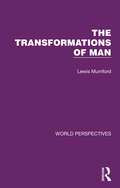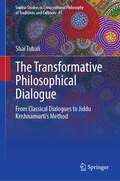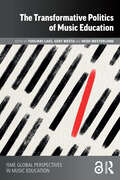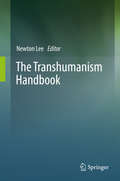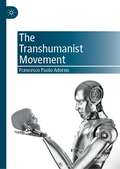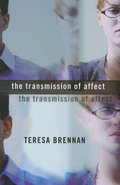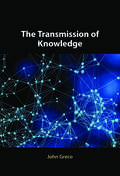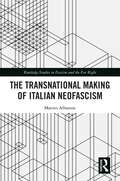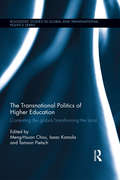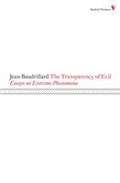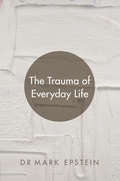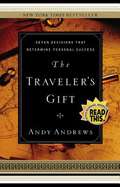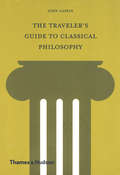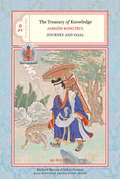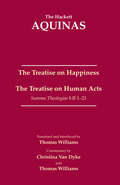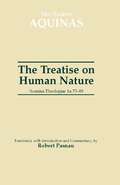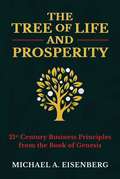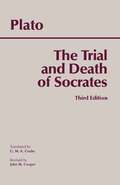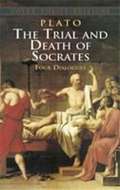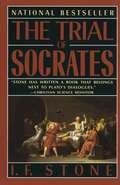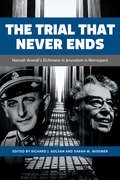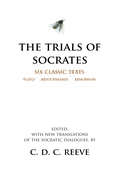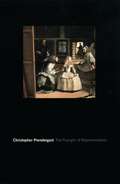- Table View
- List View
The Transformations of Man (World Perspectives #7)
by Lewis MumfordOriginally published in 1957, this volume compares the 20th Century transformation of human life to the revolution which swept early man into the first civilized communities. It shows how each radical new stage of human development grew out of changes in human personality and consciousness, such as the invention of language and symbols, the origins of universal religions and the mechanization of everyday life. Despite the threat that the author foresees from an over-reliance on automation, the book maintains that humanity still has the means, spiritual, personal and technological to create a sustainable future for itself, by increasing the usefulness and freedom of all men.
The Transformative Mind
by Anna StetsenkoThe book suggests a transition from a relational worldview premised on the socio-political ethos of adaptation towards a transformative worldview premised on the ethos of solidarity and equality. Expansively developing Vygotsky's revolutionary project, the Transformative Activist Stance integrates insights from a vast array of critical and sociocultural theories and pedagogies and moves beyond their impasses to address the crisis of inequality. This captures the dynamics of social transformation and agency in moving beyond theoretical and political canons of the status quo. The focus is on the nexus of people co-creating history and society while being interactively created by their own transformative agency. Revealing development and mind as agentive contributions to the 'world-in-the-making' from an activist stance guided by a sought-after future, this approach culminates in implications for research with transformative agendas and a pedagogy of daring. Along the way, many key theories of mind, development and education are challenged and radically reworked.
The Transformative Philosophical Dialogue: From Classical Dialogues to Jiddu Krishnamurti’s Method (Sophia Studies in Cross-cultural Philosophy of Traditions and Cultures #41)
by Shai TubaliThis book explores dialogue as a transformative form of philosophical practice by unveiling the method behind the unique dialogue developed by mystic and thinker Jiddu Krishnamurti (1895–1986). While Krishnamurti himself generally rejected the cultivation of systems and techniques, Shai Tubali argues that there are easily identifiable patterns through which Krishnamurti strove to realize his dialogical aims. For this reason, he refers to this method, whose existence has evaded Krishnamurti’s followers and scholars alike, as the Krishnamurti dialogue. He suggests that these discursive patterns serve to broaden our understanding of the possibilities of philosophical and religious dialogues and further illuminate established forms of dynamic discourse, such as the Socratic method. Inspired by Pierre Hadot’s revolutionary reading of the classical Greco-Roman texts, the author centers his attention on Plato’s Socratic dialogues and the guru–disciple conversations in the Hindu Upanishads, which fall within the scope of what may be termed ‘the transformative dialogue’: dialogues that have been written with the intention of bringing about a transformation in the mind of the interlocutor and reader and reorienting their way of life. This text appeals to students as well as researchers and suggests that the Krishnamurti dialogue is not only a continuation and development of the transformative dialogue, but that it also amalgamates ingredients of classical Western philosophy and South Asian mysticism. Moreover, this type of dialogue encourages readers to revisit the lost practice of transformative philosophy, in that it reveals new pathways of philosophical and religious inquiry that bear thought-provoking practical implications.
The Transformative Politics of Music Education (ISME Series in Music Education)
by Gert Biesta Heidi Westerlund Tuulikki LaesThis book introduces a unique approach to the interconnections between music education and politics. By taking a broader, more diverse, and explicitly ethico-political philosophical and theoretical stance, the book challenges institutional and structural conditions that may be resistant to change and expands the understanding of the professional responsibility of music educators in the 21st century to meet a variety of societal and ecological challenges.Emerging from a collaboration between international music education scholars and prominent contemporary educational theorist Gert Biesta, this book connects contemporary educational theories with music education to unlock its transformational capacity. In eight chapters, the contributors show how music education can move towards ways of being and doing that are attuned to social justice and to the broader social and ecological responsibility of music professionals. Strengthening the interdisciplinary connections between music education and education, philosophy, sociology, policy, systems thinking, and more, the volume offers a renewed vision of the scope and boundaries of both music teacher education and professional work in music more widely.Connecting the decades-long work of internationally established music educator scholars and ideas from large-scale research projects with a shared interest in transformative theorisation, this book fills a knowledge gap and reframes the philosophy of music education as a vibrantly multidisciplinary, theory-generating field. Relevant to researchers and students across music teacher education and performance studies, this book speaks to both conservatoires and university contexts across Europe and North America, helping us unlock the transformative capacity of music education.
The Transhumanism Handbook
by Newton LeeModern humanity with some 5,000 years of recorded history has been experiencing growing pains, with no end in sight. It is high time for humanity to grow up and to transcend itself by embracing transhumanism. Transhumanism offers the most inclusive ideology for all ethnicities and races, the religious and the atheists, conservatives and liberals, the young and the old regardless of socioeconomic status, gender identity, or any other individual qualities. This book expounds on contemporary views and practical advice from more than 70 transhumanists. Astronaut Neil Armstrong said on the Apollo 11 moon landing in 1969, “One small step for a man, one giant leap for mankind.” Transhumanism is the next logical step in the evolution of humankind, and it is the existential solution to the long-term survival of the human race.
The Transhumanist Movement
by Francesco Paolo AdornoThe book is published as part of the "PRIN 2017 The Dark side of the Law".This volume analyzes the theoretical underpinnings of the academic transhumanism movement, beginning with the relationship between anthropology and technique. The author focuses on the question of immortality, which can be considered the core of transhumanism. The true depth of immortality will be discussed, through which and how many transformations could be produced in order to change our society, which is basically shaped by and for human mortal beings, in a society composed by immortal persons. Some writers have written about what a future populated with immortals might look like, which is far removed from both the bright future painted by transhumanists and from the disappearance of humanity feared by bioconservatives.
The Transmission of Affect
by Teresa BrennanThe idea that one can soak up someone else's depression or anxiety or sense the tension in a room is familiar. Indeed, phrases that capture this notion abound in the popular vernacular: "negative energy," "dumping," "you could cut the tension with a knife." The Transmission of Affect deals with the belief that the emotions and energies of one person or group can be absorbed by or can enter directly into another. The ability to borrow or share states of mind, once historically and culturally assumed, is now pathologized, as Teresa Brennan shows in relation to affective transfer in psychiatric clinics and the prevalence of psychogenic illness in contemporary life. To neglect the mechanism by which affect is transmitted, the author claims, has serious consequences for science and medical research. Brennan's theory of affect is based on constant communication between individuals and their physical and social environments. Her important book details the relationships among affect, energy, and "new maladies of the soul," including attention deficit disorder, chronic fatigue syndrome, codependency, and fibromyalgia.
The Transmission of Knowledge
by John GrecoHow do we transmit or distribute knowledge, as distinct from generating or producing it? In this book John Greco examines the interpersonal relations and social structures which enable and inhibit the sharing of knowledge within and across epistemic communities. Drawing on resources from moral theory, the philosophy of language, action theory and the cognitive sciences, he considers the role of interpersonal trust in transmitting knowledge, and argues that sharing knowledge involves a kind of shared agency similar to giving a gift or passing a ball. He also explains why transmitting knowledge is easy in some social contexts, such as those involving friendship or caregiving, but impossible in contexts characterized by suspicion and competition rather than by trust and cooperation. His book explores phenomena that have been undertheorized by traditional epistemology, and throws new light on existing problems in social epistemology and the epistemology of testimony.
The Transnational Making of Italian Neofascism (Routledge Studies in Fascism and the Far Right)
by Matteo AlbaneseThis book delves into the evolution of Italian neo-fascism from the end of World War II to the mid-1970s.It examines the transition from historical fascism to neo-fascism, highlighting the survival and adaptation of fascist ideologies within democratic frameworks. This book explores the formation and development of the Italian Social Movement (MSI) and the broader neo-fascist network, emphasising its transnational connections and ideological persistence. Key themes include the escape and reorganisation of former fascists, their influence on post-war Italian politics, and the cultural and ideological debates within the neo-fascist movement. The work also addresses the role of race, anti-communism, and the strategic alliances formed during the Cold War. By tracing the historical and ideological continuities, this book provides a comprehensive understanding of neo-fascism's enduring impact on Italian and global political landscapes.It will be of interest to students and scholars of fascism, political history, and Italian politics.
The Transnational Politics of Higher Education: Contesting the Global / Transforming the Local (Routledge Studies in Global and Transnational Politics)
by Tamson Pietsch Meng-Hsuan Chou Isaac KamolaThis edited volume introduces readers to the relationship between higher education and transnational politics. It shows how higher education is a significant arena for regional and international transformation as well as domestic political struggle replete with unequal power relations. This volume shows: The causes and impacts of recent transformations in higher education within a transnational context; Emerging similarities in objectives, institutional set-ups, and approaches taking place within higher education institutions across different world regions; The asymmetrical relations between various kinds of institutional, commercial and state actors across borders; The extent to which historical and colonial legacies are important in the transformation of higher education; The potential effects these developments have on the current structure of international political order. Drawing on case studies from across the Middle East, Asia, Africa, Latin America, and Europe, the contributors develop diverse perspectives explaining the impact of transnational politics on higher education—and higher education on transitional politics—across time and locality. This book is among the first multi-disciplinary effort to wrestle with the question of how we can understand the political role of higher education, and the political force universities exert in the realm of international relations.
The Transparency Of Evil: Essays On Extreme Phenomena (Radical Thinkers)
by Jean Baudrillard James BenedictIn this, his most important collection of essays since Le systeme des objets, Jean Baudrillard contemplates Western culture “after the orgy”—the orgy, that is, of the revolutions of the 1960s. The sexual revolution has led, he argues, not to sexual liberation but to a reign of transvestism, to a confusion of the categories of man and woman—to the “androgenous and Frankenstein appeal of a Michael Jackson.” The revolution in art has led to a “transaesthetic realm of indifference.” The cybernetic revolution has blurred the distinction between man and machine, while the political revolution has led to a ‘transpolitics’ that merely simulates old political forms. Such are the points of Baudrillard’s compass as he steers his way through the mental landscape of this febrile fin de siecle.
The Trauma of Everyday Life
by Dr EpsteinTrauma does not just happen to a few unlucky people; it is the bedrock of our psychology. Death and illness touch us all, but even the everyday sufferings of loneliness and fear are traumatic. In The Trauma of Everyday Life renowned psychiatrist and author of Thoughts Without a Thinker Mark Epstein uncovers the transformational potential of trauma, revealing how it can be used for the mind's own development. Epstein finds throughout that trauma, if it doesn't destroy us, wakes us up to both our minds' own capacity and to the suffering of others. It makes us more human, caring and wise. It can be our greatest teacher, our freedom itself, and it is available to all of us.Western psychology teaches that if we understand the cause of trauma, we might move past it while many drawn to Eastern practices see meditation as a means of rising above, or distancing themselves from, their most difficult emotions. Both, Epstein argues, fail to recognize that trauma is an indivisible part of life and can be used as a tool for growth and an ever deeper understanding of change. When we regard trauma with this perspective, understanding that suffering is universal and without logic, our pain connects us to the world on a more fundamental level. Guided by the Buddha's life as a profound example of the power of trauma, Epstein's also closely examines his own experience and that of his psychiatric patients to help us all understand that the way out of pain is through it.
The Traveler's Gift: Seven Decisions that Determine Personal Success
by Andy AndrewsWHAT MAKES THE DIFFERENCE between failures AND SUCCESS? From the European theater of World War II to a warehouse in heaven, David encounters some of the wisest people who ever lived.
The Traveler's Guide to Classical Philosophy
by John GaskinA companion for visitors to Greece and Rome, and for armchair travelers as well. John Gaskin unfolds the thinking about nature, life, death, and other worlds that informed the culture and society of the classical world--still visible in today's cityscapes and archaeological sites--and draws out its relevance and interest for the modern reader. It was the Greeks who first asked and discussed in a rational way two fundamental questions that never cease to concern thinking human beings: what is the nature of the universe, and what can I make of my brief time in it? Their answers, developed between the eighth century BC and the fourth century AD, are still relevant to the modern reader and traveler. The author associates each philosopher and his ideas with a particular tourist destination, and a gazetteer describes the sites and notes the people and ideas connected with them.
The Treasury of Knowledge, Books 9 and 10: Journey and Goal (The Treasury of Knowledge #10)
by Jamgön KongtrulThis is the final volume of a 10-volume set.
The Treatise on Happiness • The Treatise on Human Acts
by Thomas Aquinas Christina Van DykeThe fifth volume of The Hackett Aquinas, a series of central philosophical treatises of Aquinas in new, state-of-the-art translations accompanied by a thorough commentary on the text.Acclaim for previous volumes in the series:The Treatise on Human Nature Translated, with Commentary, by Robert Pasnau "This very readable and accurate translation of the so-called Treatise on Human Nature strikes the right balance between literal rendition of Aquinas' Latin and naturalness of English expression, and thus will be of use both to new students of Aquinas and to those familiar with the original Latin. The commentary on the text should make the translation especially suitable for use in courses on Aquinas' philosophy of human nature and theory of knowledge." —Deborah Black, University of TorontoThe Treatise on the Divine Nature Translated, with Commentary, by Brian J. Shanley, O.P. "That Shanley's translation-cum-commentary can open students to such a rich appropriation of Aquinas explains why I call it 'superb.'" —David Burrell, The ThomistDisputed Questions on Virtue Translated by Jeffrey Hause and Claudia Eisen Murphy; Commentary by Jeffrey Hause "Hause and Murphy are to be congratulated. [Their volume's] strong points are numerous and important. The translation is clear and faithful. . . . Hause offers an extended commentary which is solid and helpful for beginning readers. . . . A gem." —R. E. Houser, Notre Dame Philosophical Reviews
The Treatise on Human Nature: Summa Theologiae 1a 75-89
by Thomas Aquinas Robert PasnauThis series offers central philosophical treatises of Aquinas in new, state-of-the-art translations distinguished by their accuracy and use of clear and nontechnical modern vocabulary. Annotation and commentary accessible to undergraduates make the series an ideal vehicle for the study of Aquinas by readers approaching him from a variety of backgrounds and interests.
The Tree of Life and Prosperity: 21st Century Business Principles from the Book of Genesis
by Michael A. EisenbergOne of Israel&’s most successful venture capitalists uses the words and actions of the Hebrew patriarchs to lay the foundations for a modern growth economy based on timeless business principles and values.Entrepreneurs, businessmen, and investors are constantly looking for principles and rules that will pave the way for success. Usually, those at the forefront are successful entrepreneurs from Silicon Valley or legendary Wall Street investors. But the principles of economic growth, wealth creation and preservation were written long before the rise of the modern market economy and its heroes. Michael Eisenberg—one of the most successful venture capitalists in Israel, and one of the first investors in Lemonade, and Wix—reveals in The Tree of Life and Prosperity the eternal principles for successful business, economics, and negotiation hidden in the Torah—and shows their relevance to the modern world we live in.
The Trial and Death of Socrates, 3rd edition: Euthyphro, Apology, Crito, death scene from Phaedo (Hackett Classics)
by Plato G. M. A. Grube John M. CooperThe third edition of The Trial and Death of Socrates presents G. M. A. Grube's distinguished translations, as revised by John Cooper for Plato, Complete Works. A number of new or expanded footnotes are also included along with a Select Bibliography.
The Trial and Death of Socrates: Four Dialogues
by Plato Benjamin JowettAmong the most important and influential philosophical works in Western thought: Euthyphro, exploring the concepts and aims of piety and religion; Apology, a defense of the integrity of Socrates' teachings; Crito, exploring Socrates' refusal to flee his death sentence; and Phaedo, in which Socrates embraces death and discusses the immortality of the soul.
The Trial of Socrates
by I. F. StoneIn unraveling the long-hidden issues of the most famous free speech case of all time, noted author I.F. Stone ranges far and wide over Roman as well as Greek history to present an engaging and rewarding introduction to classical antiquity and its relevance to society today.
The TrialThat Never Ends: Hannah Arendt's 'Eichmann in Jerusalelm' in Retrospect
by Richard J. Golsan Sarah MisemerThe fiftieth anniversary of the Adolf Eichmann trial may have come and gone but in many countries around the world there is a renewed focus on the trial, Eichmann himself, and the nature of his crimes. This increased attention also stimulates scrutiny of Hannah Arendt’s influential and controversial work, Eichmann in Jerusalem. The contributors gathered together by Richard J. Golsan and Sarah M. Misemer in The Trial That Never Ends assess the contested legacy of Hannah Arendt’s famous book and the issues she raised: the "banality of evil", the possibility of justice in the aftermath of monstrous crimes, the right of Israel to kidnap and judge Eichmann, and the agency and role of victims. The contributors also interrogate Arendt’s own ambivalent attitudes towards race and critically interpret the nature of the crimes Eichmann committed in light of newly discovered Nazi documents. The Trial That Never Ends responds to new scholarship by Deborah Lipstadt, Bettina Stangneth, and Shoshana Felman and offers rich new ground for historical, legal, philosophical, and psychological speculation.
The Trials of Academe: The New Era of Campus Litigation
by Amy GajdaOnce upon a time, virtually no one in the academy thought to sue over campus disputes, and, if they dared, judges bounced the case on grounds that it was no business of the courts. Tenure decisions, grading curves, course content, and committee assignments were the stuff of faculty meetings, not lawsuits. Not so today. As Amy Gajda shows in this witty yet troubling book, litigation is now common on campus, and perhaps even more commonly feared. Professors sue each other for defamation based on assertions in research articles or tenure review letters; students sue professors for breach of contract when an F prevents them from graduating; professors threaten to sue students for unfairly criticizing their teaching. Gajda’s lively account introduces the new duo driving the changes: the litigious academic who sees academic prerogative as a matter of legal entitlement and the skeptical judge who is increasingly willing to set aside decades of academic deference to pronounce campus rights and responsibilities. This turn to the courts is changing campus life, eroding traditional notions of academic autonomy and confidentiality, and encouraging courts to micromanage course content, admissions standards, exam policies, graduation requirements, and peer review. This book explores the origins and causes of the litigation trend, its implications for academic freedom, and what lawyers, judges, and academics themselves can do to limit the potential damage.
The Trials of Socrates: Six Classic Texts
by Plato Aristophanes Xenophon C. D. ReeveLampooned in 406 B.C.E. in a blistering Aristophanic satire, Socrates was tried in 399 B.C.E. on a charge of corrupting the youth, convicted by a jury of about five hundred of his peers, and condemned to death. Glimpsed today through the extant writings of his contemporaries and near-contemporaries, he remains for us as compelling, enigmatic, and elusive a figure as Jesus or Buddha. Although present-day (like ancient Greek) opinion on the real Socrates diverges widely, six classic texts that any informed judgment of him must take into account appear together, for the first time, in this volume. Those of Plato and Xenophon appear in new, previously unpublished translations that combine accuracy, accessibility, and readability; that of Aristophanes' Clouds offers these same qualities in an unbowdlerized translation that captures brilliantly the bite of Aristophanes' wit. An Introduction to each text and judicious footnotes provide crucial background information and important cross-references.
The Triangle of Representation
by Christopher PrendergastMoving deftly among literary and visual arts, as well as the modern critical canon, Christopher Prendergast's book explores the meaning and value of representation as both a philosophical challenge (What does it mean to create an image that "stands for" something absent?) and a political issue (Who has the right to represent whom?).The Triangle of Representation raises a range of theoretical, historical, and aesthetic questions, and offers subtle readings of such cultural critics as Raymond Williams, Paul de Man, Edward Said, Walter Benjamin, and Hélène Cixous, in addition to penetrating investigations of visual artists like Gros, Ingres, and Matisse and significant insights into Proust and the onus of translating him. Above all, Prendergast's work is a striking display of how a firm grounding in theory is essential for the exploration of art and literature.
